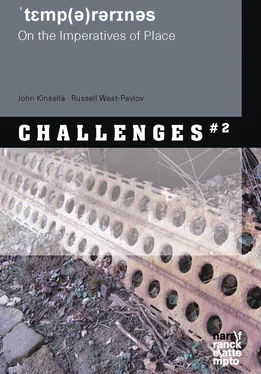As I sit on the Oude Gracht with a local beer, my resolve hardens to mark this sense of the exhaustion of temporary academic mores by setting, mentally at least, a sort of a caesura. I must engineer an emergency exit from the maze and craze of article-writing and funding quests—for what we are confronted with outside the pleasure garden is indeed an emergency. As Benjamin (1999: 248-9) reminds us, ‘[t]he tradition of the oppressed teaches us that the “state of emergency” in which we live is not the exception but the rule. We must attain to a conception of history that is in keeping with this insight. Then we shall clearly realise that it is our task to bring about a real state of emergency, and this will improve our position in the struggle against fascism.’ Remembering Benjamin, I tell myself, without knowing quite how to go about it, that I need to emerge from the funhouse and provoke my own emergency at least. I must turn my face towards the ‘con-temporary’ (Ganguly 2016), with its very present threat of a re-emergent fascism worldwide. The search for an answer to this urgently sensed imperative to turn towards the ‘con-temporary’ has resulted, in part, in this book: personal, political, embodying an ongoing search for a direct link between the two that is the nexus of writing, thinking, inhabiting place, and engaging with others in an effort to effect positive change. Trivial and ‘minor’ these efforts may be, ‘[yet] that future horizon frames in this narrative an understanding of how the future emerges, changed, out of such catastrophes’ as ours today, and how ‘the most intimate, even minimal, acts ... [r]emake the terms for collective survival’ (Lloyd 2008: 37).
I channel all my frustration and fury into my own paper, which I give on the afternoon I’m due to fly out from Schipol. I abandon my original written text and speak directly to my fellow university teachers, from over-worked instructors to lecterned professors, habituées of the classroom one and all, gathered around the same large table as me. I speak about our everyday task of teaching, ‘that most practical aspect of our trade’, as Spivak (2012: 255) calls it.
Teaching, and especially the teaching of future teachers, which makes up the bulk of literary studies scholars’ work in the German academic system at least, feels to me like a genuine site where the literary humanities touch the real (Schalkwyk 2004). I argue for an animism in the classroom—a sense of co-agency infusing every aspect of the teaching environment, including the apparently inanimate actors in the pedagogical project—books, blackboard, biros, desks, chairs, the classroom itself—as a configuration of co-actants out of whose intermeshed work knowledge production is generated.
You never step into the same classroom twice: Carol Oomera Edwards’s Australian Indigenous sense of the classroom as Country (i.e. as an animate landscape where identifiable features of the terrain are the ancestors watching over and giving life to the environment) means that every entry into the classroom invokes a respectful pedagogy of place: ‘Hello, only us mob coming, OK if we camp here again? ... Hello, my name is Tommy. OK if I spend a year with you here?’ (Carol Oomera Edwards, qtd in Muecke 2004: 69). The classroom is a temporary space because it is peopled with beings constantly interacting with each other and thus implicated in constantly recalibrated relationships in which persons (human and nonhuman alike; Vivieros de Castro 2014) ceaselessly make each other anew. This ‘meshwork’ (Ingold 2011: 63-94) has no outer limits. Teaching and learning is a constantly transforming interaction with others on an infinite tapestry that spreads out beyond the four walls of the classroom to connect up with the world.
Several months after my brief sojourn in Utrecht, the sense of a caesura persists—or at least, the feeling, that I have traversed what Heidegger once called a Kehre : a bend in the track that takes one in a quite different direction, although the road is the same and, because other countervailing hairpin bends may follow, the general orientation remains despite the zigzag progress of the route. Much of what I have done for the past two decades seems to have reached its use-by-date. The discipline of literary studies into which I was inducted—at the twilight of new criticism and in the heady heyday of deconstruction and new historicism—has made me what I am, but I have a sense that it has lost the impetus to make me (or more to the point, us) what I (or we) may become.
What now? From fleeting engagement to fleeting engagement with texts and text-makers, from one fragmentary site of word-making to another—onwards step by step in a process of ongoing poeisis in the world with whichever partners, co-writers, colleagues near and far, students, activists, books, languages, places, that may be at hand.
RWP
Journaling an Activist Poetics
I have been keeping a journal since I was fifteen. Most of my early journals are long gone, but some remain from when I was nineteen and twenty. The journal was quite different from a diary, which I also kept—mainly to record what had to be done rather than what was to be done. As I became more directly ‘activist’ in my late teens, attending protest rallies against nuclear energy, against the logging of old-growth forests, and in support of indigenous land rights, elements of my thinking about the nature of protest, and where it did or didn’t segue with writing poetry, started to appear. As the years went by and activism became the major focus of my interaction with ‘public space’, and poetry increasingly became a means for me to express what inevitably led to the lock-up in the ‘outside’ world, the focus in my journals shifted to writing about how best to create an activist poetics, how to create a dialogue between the poetic act and the activist moment.
This is not to say that the journals became purely places of discussing modes of protest; rather, they are a space for the consideration of what a poem might focus on so as to extend my desire to articulate my distress at the degradation of human rights and the ‘natural’ environment. I look back over a life of writing poetry—I started as a child—and sadly find a ‘tracking’ of environmental destruction and climate change. However, this is not a case of the poems necessarily ‘saying’ something is wrong, but of it being implied in what the poem is observing. My journals, and my poetry, are often inscriptions of the world around me in any given place or time. So, I will record the presence of different birds, insects, mammals and so on. I will discuss plant types and what phase of their cycle they are in, and so on. It’s in these records that I track the truest activism I can offer: a witnessing, and a recording.
What follows is a series (albeit syncopated) of journal entries written between June and October 2016, from recent journals that utilise much the same kind of patterning as my journals have over the decades. You will hear the observations of place and a lot of conjecturing over the nature of place and space; you will get opinion on various texts I am reading, you will have the tendentious and the overtly subjective, and you’ll get information on environmental and social issues I feel strongly about, and am trying to respond to in activist ways.
But this is not merely a set of disparate journal entries. I want to say that I always write with two formal agendas—one is for each day to be contained in itself, but second, for each day to connect to the discourse of other days. In other words, the journals have their own diegesis, their own narrative arc and their own dialogics with that (or those) narrative/s. At times, the journal becomes a poem sketchbook; at others, interludes in essay-making, but all in all, they are an expression of my angst at failing to halt the destruction I see happening around me daily.
Читать дальше












